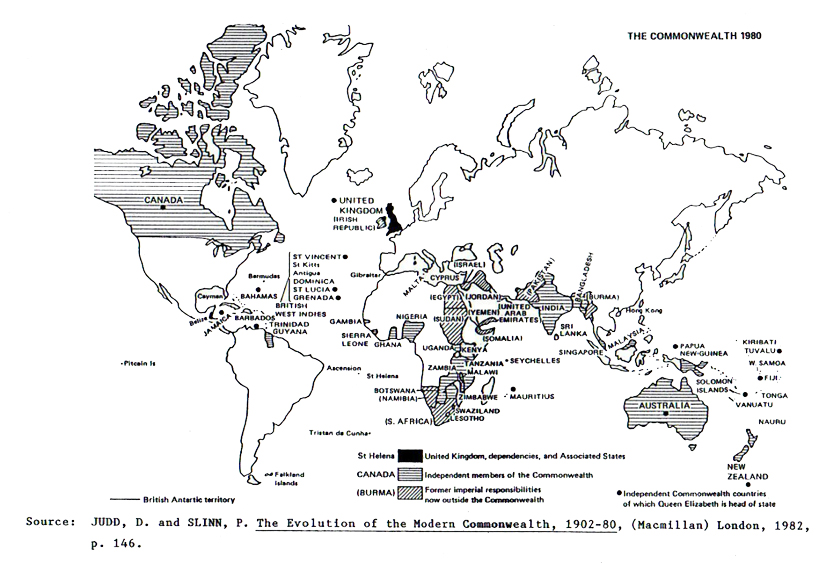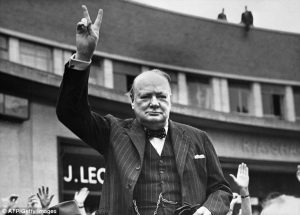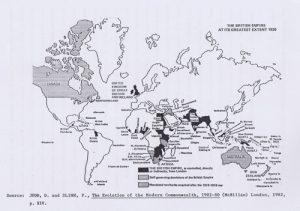From the British Empire to the Modern Commonwealth
However, not all the former members of the British Empire continued ties with Britain. “There was the precedent of the thirteen North American colonies which forcibly took their independence between 1776 and 1783. In the twentieth century, however, the withdrawals were agreed to more amicably.”19 During the 1930s, as we saw in the previous chapter, the Irish, or at least the southern Irish, extracted themselves from the British connection though the independence of Eire was not formally recognised until 1949. Egypt had never formally been part of the empire, although a protectorate was established there between 1914 and 1922 and various degrees of British military occupation had been imposed between 1886 and 1956. The Anglo-Egyptian Sudan, which had been run as a condominium by Britain and Egypt since 1899, was granted its independence in 1956; and it withdrew from the Commonwealth. Britain’s rule over League of Nation’s mandate in the Middle East was exercised fairly lightly, with independence being granted to Iraq in 1932 and the Trans-Jordan in 1946. The violence of the two communities in Palestine led Britain to relinquish quickly its charge there and the independent state of Israel emerged. Burma, on receiving its independence in 1947, immediately left the Commonwealth. In 1960 British Somaliland joined up with Italian Somalia to become an independent state outside the Commonwealth; similarly, the Southern Cameroons joined the French Cameroons in 1961 and left the Commonwealth. The People’s Republic of Southern Yemen pulled out in 1967, while Pakistan left in 1972 after failing to receive support in its civil war. East Pakistan, however, stayed within the Commonwealth, as the new state of Bangladesh. In 1961 South Africa voluntarily withdrew from the Commonwealth, probably just before being pushed out because of its racial policies. The white settlers of Southern Rhodesia in 1965 unilaterally declared their independence of Britain; this followed prolonged attempts by the British government and Black pressure groups to coax or coerce the whites into granting adequate political rights to the black majority population. Finally, in April 1980, Rhodesia attained legal independence as the state of Zimbabwe. It became the forty-third member state of the Commonwealth.
| Commonwealth Membership as at 31 December 1980 | |||
|---|---|---|---|
| Date of Membership | |||
| Australia | Q | (1901) | |
| Bahamas | Q | 1973 | |
| Bangladesh | R | 1972 | |
| Barbados | Q | 1966 | |
| Botswana | R | 1966 | |
| Canada | Q | (1867) | |
| Cyprus | R | 1961 | (independence 1960) |
| Dominica | R | 1978 | |
| Fiji | Q | 1970 | |
| The Gambia | R | 1965 | |
| Ghana | R | 1957 | |
| Grenada | Q | 1974 | |
| Guyana | R | 1966 | |
| India | R | 1947 | |
| Jamaica | Q | 1962 | |
| Kenya | R | 1963 | |
| Kiribati | R | 1979 | |
| Lesotho | M | 1966 | |
| Malawi | R | 1964 | |
| Malaysia | M | 1957 | |
| Malta | R | 1964 | |
| Mauritius | Q | 1968 | |
| Nauru* | R | 1968 | |
| New Zealand | Q | (1907) | |
| Nigeria | R | 1960 | |
| Papua New-Guinea | Q | 1975 | |
| St. Lucia | Q | 1979 | |
| St. Vincent* | Q | 1979 | |
| Seychelles | R | 1976 | |
| Sierra Leone | R | 1961 | |
| Singapore | R | 1965 | |
| Solomon Islands | Q | 1978 | |
| Sri Lanka | R | 1948 | |
| Swaziland | M | 1968 | |
| Tanzania | R | 1961 | |
| Tonga | M | 1970 | |
| Trinidad and Tobago | R | 1962 | |
| Tuvalu* | Q | 1979 | |
| Uganda | R | 1962 | |
| United Kingdom | Q | ||
| Vanuatu | R | 1980 | |
| Western Samoa | M | 1970 | (independent 1962) |
| Zambia | R | 1964 | |
| Zimbabwe | R | 1980 | |
| key | |
|---|---|
| * | Special member |
| Q | Queen Elizabeth as Head of State |
| M | Other monarchy |
| R | Republic |
Note: Belize and Antigua / Barbuda achieved independence in 1981, bringing the membership of the Commonwealth to forty-six. In each case Queen Elizabeth remained as head of state.
(From JUDD, D. and SLINN, P. The Evolution of the Modern Commonwealth. 1902-80. (McMillan) London, 1982, pp. 144-145.)




